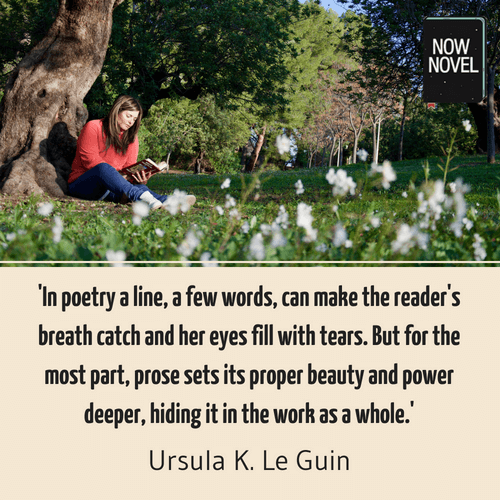Writing prose, like writing poetry, involves specific challenges. Although prose is closer to ‘ordinary’, ‘everyday’ speech than poetry, it is easy to write purple prose and make other small mistakes.
Here are 5 steps to refine your prose writing style:
First: How do you define prose?
The strict definition of prose is ‘written or spoken language in its ordinary form, without metrical structure’ (OED). The ‘haiku’ is an example of writing with metrical structure because it has a fixed number of syllables per line. This creates a more ‘fixed’ rhythmic pattern than the typical free line of prose.
Some authors tend more towards terse, minimalist prose (for example, Hemingway’s clipped, straightforward writing style). Others tend to use longer sentences with complex sentence structure (syntax).
So how do you polish the ‘ordinary’ language you use to narrate a story?
1. Make your prose style fit your subject and narrator
It stands out when a writer’s prose style feels strange for their subject. For example, in a historical novel set in Tudor England, it would seem strange to read modern American slang words.
If you’re narrating the tense setup of an action-packed thriller scene, it will dilute tension and drama if you write over-complicated, long sentences.
Another point to remember is that the words your narrator uses tell the reader who they are. A narrator who often swears, is sarcastic and exaggerates will likely come across as younger than, for example, a narrator who uses large words and has a more ‘mature’ voice.
When finding a prose style to convey your narrator’s voice, think about:
- Their age: Are there particular ways people in this age group tend to speak?
- Their background: Do they come from a rough or luxury-filled background or somewhere in-between? How would their backstory influence their vocabulary or tone?
- Their persona: Is your narrator optimistic mostly or pessimistic? What are their views and values? How could these details shape the language they use to tell the story?
- Elements of setting: How do time and place influence your narrator’s focus, along with their words and phrases?
2. Be concise where possible
Reading is a joy. Reading is also work. Don’t leave the reader’s main job (to enjoy, think, or feel) overshadowed by needlessly difficult reading.
Cut out filter and filler words (instead of ‘She saw that the door was locked’, say ‘The door was locked’).
When you excise unnecessary words, your prose is cleaner, clearer.
Compare the following:
‘A woman who turns out to be her mother bends over her and she says in a drawn out, not warm, not enthusiastic voice, “You are not trying, my girl. You must try harder.” Her mother is wearing her finest clothes and her speech is fine too, like some Edinburgh lady’s speech.’
Compare the above altered sentences from Alice Munro’s story ‘The View from Castle Rock’ to what Munro actually writes:
‘Her mother bends over her and says in a drawling, cold, lackadaisical voice, “You are not trying, my girl. You must try harder.” Her mother is all dressed up and talking fine, like some Edinburgh lady.’
The second example is concise. We don’t need a moment where the character in labour realizes the woman bending over her is her mother. The moment of realization from the first example (‘the woman who turns out to be…’) serves no narrative purpose.
See also how Munro finds concise, exact words to describe the mother’s voice – ‘cold’ instead of ‘not warm’, ‘lackadaisical’ instead of ‘not enthusiastic’. Qualities are stated in positive form (you wouldn’t touch a hot stove and say ‘Ouch! That’s not cold!’).
Also notice how Munro structures the sentence. Unlike the changed, first example, it avoids the clunky effect of having ‘speech’ repeated twice towards the end of the last sentence.
Details such as these – being concise in word choice and selective in description – make prose crisper and clearer.

3. Avoid monotonous structure
In prose writing, having the same word at the end of a sentence in two sentences, or repeating the exact same grammatical structure over and over, quickly get monotonous.
To avoid tiring prose:
- Vary rhythm: Make some sentences short. Let others spool out slowly. Variety will keep your reader engaged
- Switch up syntax: If every sentence is structured exactly the same, your writing may start to plod
Compare these sentences:
‘I was tired. I was running to make the train but just missed it. I sat down, wondering what to do.’
The repetitive starting structure of ‘I’ + verb gets predictable. Compare to:
‘Stifling a yawn, I ran to make the train. Damn. Missed it by a few seconds. I slumped down, wondering what to do.’
The second example has sentence fragments, curses (‘damn’). The syntax (the structure) is varied and the occasional sentence fragment (or single word) adds quicker pace.
4. Find stronger substitutes for weak qualifiers
Qualifiers – words like ‘very’, ‘really’, ‘extremely’ that indicate degree – are imprecise. If you say a character was ‘very happy’, for example, just how happy were they?
If a qualifier doesn’t make your base describing word clearer, just use the word itself. E.g. ‘He was happy’. To show intensity, pick a synonym that has the qualifier built into the meaning of the word. For example, ‘ecstatic’. To say a character was ‘ecstatic’ literally means to say they are beside themselves with happiness (from the Greek ekstasis meaning ‘standing outside oneself’).
A partial list of alternatives for weak qualifiers to use in prose writing:
- Very sad – bereft, miserable, dejected, forlorn, crestfallen
- Very cold – freezing, icy, frosty, chilled, arctic
- Really glad – relieved, overjoyed, delighted
- Extremely angry – furious, livid, frothing, outraged, apoplectic
- Quite frightened – nervous, anxious, shuddering, tentative
To improve your prose style in a draft, scan through for weak qualifiers and find synonyms for the describing word you’ve chosen that give deeper description.

5. Replace vague abstracts with concrete imagery
Great prose writing gives concrete, vivid imagery. The higher the number of abstract nouns in a sentence, for example, the more vague and hazy the writing comes across.
For example, compare these two sentences:
‘He craved freedom, the happiness of a peaceful life.’
To:
‘He craved running the overgrown track that ran to the top of the escarpment behind his house on a quiet morning.’
The second examples gives a specific image of peaceful freedom. Specific imagery also is better equipped to convey characterization. From the above, we can tell the character loves the outdoors, for example.
Concrete, specific imagery permits us to visualize characters’ worlds, wants and desires clearer.
Get constructive feedback on your writing now or guidance from a personal writing coach and finish writing your novel or story.


6 replies on “Writing prose: 5 steps to better style”
Number five is spot on. While I agree the prose should be concise, our words must paint a picture for the reader.
I’m glad it connected with you, Elias. That is a challenge – juggling concision and detail. If the detail serves the story or character development, it’s often better than broad abstraction.
Thank you! Actually, I’m having a hard time writing an ecstatic prose essay hahahaha. But anyway, this is helpful
It’s a pleasure, Kath! Haha, well I hope your essay turns out well.
Very useful guide. Thanks
Thank you for the feedback, Ikhuoria. Happy New Year and good luck with your writing in the year ahead.